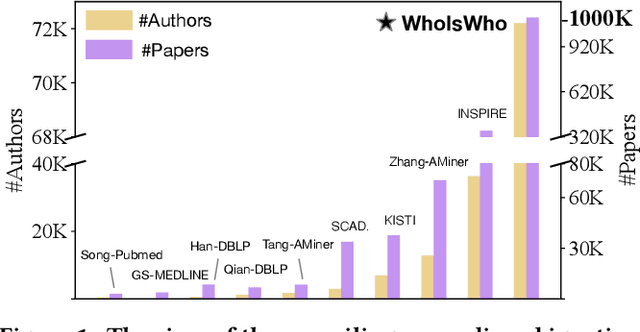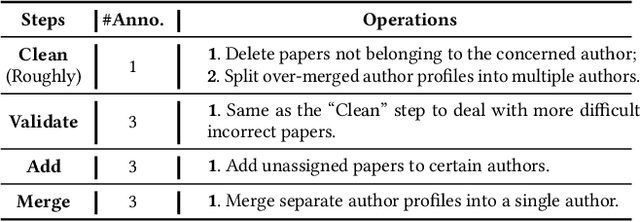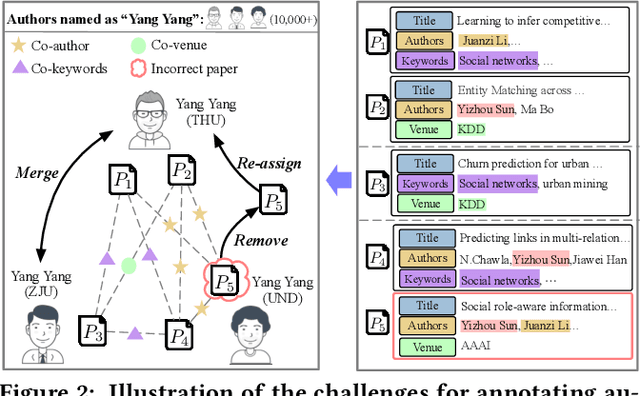Tianyi Han
OAG-Bench: A Human-Curated Benchmark for Academic Graph Mining
Feb 24, 2024



Abstract:With the rapid proliferation of scientific literature, versatile academic knowledge services increasingly rely on comprehensive academic graph mining. Despite the availability of public academic graphs, benchmarks, and datasets, these resources often fall short in multi-aspect and fine-grained annotations, are constrained to specific task types and domains, or lack underlying real academic graphs. In this paper, we present OAG-Bench, a comprehensive, multi-aspect, and fine-grained human-curated benchmark based on the Open Academic Graph (OAG). OAG-Bench covers 10 tasks, 20 datasets, 70+ baselines, and 120+ experimental results to date. We propose new data annotation strategies for certain tasks and offer a suite of data pre-processing codes, algorithm implementations, and standardized evaluation protocols to facilitate academic graph mining. Extensive experiments reveal that even advanced algorithms like large language models (LLMs) encounter difficulties in addressing key challenges in certain tasks, such as paper source tracing and scholar profiling. We also introduce the Open Academic Graph Challenge (OAG-Challenge) to encourage community input and sharing. We envisage that OAG-Bench can serve as a common ground for the community to evaluate and compare algorithms in academic graph mining, thereby accelerating algorithm development and advancement in this field. OAG-Bench is accessible at https://www.aminer.cn/data/.
A Region-Shrinking-Based Acceleration for Classification-Based Derivative-Free Optimization
Sep 20, 2023



Abstract:Derivative-free optimization algorithms play an important role in scientific and engineering design optimization problems, especially when derivative information is not accessible. In this paper, we study the framework of classification-based derivative-free optimization algorithms. By introducing a concept called hypothesis-target shattering rate, we revisit the computational complexity upper bound of this type of algorithms. Inspired by the revisited upper bound, we propose an algorithm named "RACE-CARS", which adds a random region-shrinking step compared with "SRACOS" (Hu et al., 2017).. We further establish a theorem showing the acceleration of region-shrinking. Experiments on the synthetic functions as well as black-box tuning for language-model-as-a-service demonstrate empirically the efficiency of "RACE-CARS". An ablation experiment on the introduced hyperparameters is also conducted, revealing the mechanism of "RACE-CARS" and putting forward an empirical hyperparameter-tuning guidance.
Web-Scale Academic Name Disambiguation: the WhoIsWho Benchmark, Leaderboard, and Toolkit
Feb 23, 2023



Abstract:Name disambiguation -- a fundamental problem in online academic systems -- is now facing greater challenges with the increasing growth of research papers. For example, on AMiner, an online academic search platform, about 10% of names own more than 100 authors. Such real-world hard cases cannot be fully addressed by existing research efforts, because of the small-scale or low-quality datasets that they use to build algorithms. The development of effective algorithms is further hampered by a variety of tasks and evaluation protocols designed on top of diverse datasets. To this end, we present WhoIsWho owning, a large-scale benchmark with over 1,000,000 papers built using an interactive annotation process, a regular leaderboard with comprehensive tasks, and an easy-to-use toolkit encapsulating the entire pipeline as well as the most powerful features and baseline models for tackling the tasks. Our developed strong baseline has already been deployed online in the AMiner system to enable daily arXiv paper assignments. The documentation and regular leaderboards are publicly available at http://whoiswho.biendata.xyz/.
 Add to Chrome
Add to Chrome Add to Firefox
Add to Firefox Add to Edge
Add to Edge